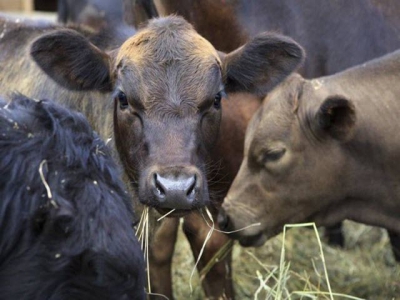Proper cattle nutrition may differ due to operations goals

Industry nutritionist discusses various feeding methods for best management
In any cattle operation, whether it is a feed lot setting or a cow/calf operation, various factors are important when considering how to maintain animal health and nutritional maintenance.
Weather a factor for many beef cattle operations
“A winter feeding operation needs to compensate for the environmental effects of cold and moisture. Wind chill increases the maintenance energy requirements, making energy concentration and intake extremely important,” said Twig Marston, beef nutritionist, research and field technical with Hubbard Feeds.
Marston added that mud can have dramatic effect on intake, so pen maintenance becomes a major concern. “Some feedlots have used bedding as an effective management tool to improve animal performance and feed efficiency in winter feeding operations,” he said.
It isn’t harder for cattle to convert feed into fat when temperatures are colder.
“Fat tissue is a product of excessive energy consumption. Once the maintenance energy of an animal is met, excess calories will be stored in the form of fat. The body is very efficient at storing energy,” Marston said.
An appropriate amount to feed cattle per feeding in the winter depends on the nutrient density of the diet and the desired performance an operation is looking to obtain. For maintenance and production, cattle must consume a certain amount of a nutrient. The amount of the nutrient is dependent on intake and diet concentration, Marston said.
“As a general rule, cows will eat from 1.5 to 3 percent of body weight in dry matter per day,” he said.
Cattle in feedlots have different intake regulators such as caloric density of the diet, the animal's size and age, the number of days on feed, sex, growth implants and feed additive programs, and environmental effects (mud, cold, heat, etc.), which all play a role in daily weight gain, Marston said.
It is important for management to make sure what they are feeding is optimal.
Proper mineral intake
Part of a balanced nutritional program is to have an excellent mineral program.
“Research trials may vary in the magnitude of the responses to mineral supplements, but studies consistently show that when dietary minerals are deficient or imbalanced, proper supplementation can have favorable return on investment,” said Marston.
Proper mineral supplementation has positive effects animal performance, fetal programming, reproductive traits, colostrum production, immunity and lactation, he said.
While mineral intake plays a vital role in beef cattle reproduction, it’s also very important to consider in a feedlot situation.
“Mineral fortification for feeder cattle can boost not only animal performance but also relieve the effects of stress, aid rehydration and elevate immune response,” he said.
Another positive factor to consider, according to Marston, is that phosphorus supplementation can increase summer grazing gains up to two pounds per day in stocker cattle. Potassium helps cattle rehydrate quicker after transportation. Trace mineral have also been found to aid in hoof health, immunity and vaccine response.
Reproduction and calf care
The most important thing to consider when feeding cows/bred heifers pre-and post calving is calf survival and continued reproduction, Marston said. All nutrients including water, protein, energy, minerals and vitamins have been shown to be important when managing this process.
When transitioning calves from nursing to creep feed, it is important for producers to provide creep feed that is highly palatable, balanced for nutrients, fresh, and properly placed and maintained.
In any instance, keeping cattle healthy and eating is crucial for returning profit.
Có thể bạn quan tâm
 New app estimates BRD prevalence of herd
New app estimates BRD prevalence of herd Bovine respiratory disease (BRD) is one of the most significant illnesses affecting the health of preweaned calves.
 Organic selenium may support cows through heat stress trials
Organic selenium may support cows through heat stress trials Supplementing dairy cow diets with organic selenium during a heat stress challenge may limit oxidative stress damage, boost milk yield and improve total
 Discovery links rumen microbes to methane emissions
Discovery links rumen microbes to methane emissions Heritable subset of core rumen microbiome dictates dairy cow productivity and emissions, according to new research.